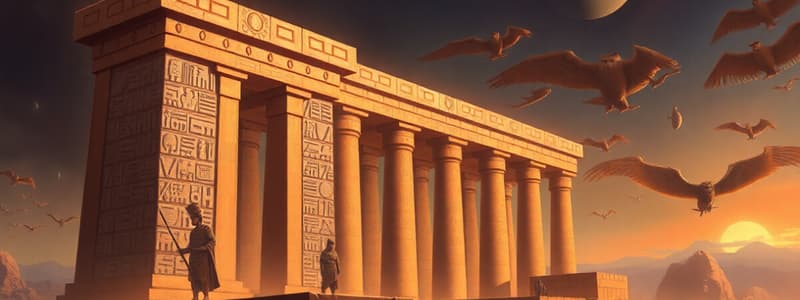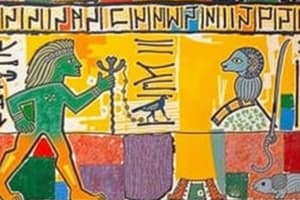Podcast
Questions and Answers
The Babylonians developed a system that greatly influenced modern mathematics. Which concept was it?
The Babylonians developed a system that greatly influenced modern mathematics. Which concept was it?
- The decimal system
- The Pythagorean theorem
- The concept of place value in numbers (correct)
- The Cartesian coordinate system
Babylonian priests used their knowledge of astronomy for what main purpose?
Babylonian priests used their knowledge of astronomy for what main purpose?
- To measure the distance to the Moon
- To prove the Earth is round
- To determine the exact speed of light
- To create astrological predictions and calendars (correct)
The Code of Hammurabi is a social technology that was pioneered in Babylon. What is the code known for?
The Code of Hammurabi is a social technology that was pioneered in Babylon. What is the code known for?
- The invention of democracy
- The creation of the United Nations
- The concept of jury trials
- The Code of Hammurabi, one of the first written legal codes (correct)
How did Babylonian innovation directly influence modern contracts and business transactions?
How did Babylonian innovation directly influence modern contracts and business transactions?
How did Babylonians systematically approach medical documentation?
How did Babylonians systematically approach medical documentation?
Which invention is considered the earliest form of paper, developed in Egypt?
Which invention is considered the earliest form of paper, developed in Egypt?
Egyptians were the first to construct what medical tool?
Egyptians were the first to construct what medical tool?
What was a major contribution by Egyptians to architecture that is still in use today?
What was a major contribution by Egyptians to architecture that is still in use today?
How did the Egyptians gain detailed knowledge of human anatomy?
How did the Egyptians gain detailed knowledge of human anatomy?
What innovation helped Egyptian boats travel against the Nile’s current?
What innovation helped Egyptian boats travel against the Nile’s current?
Which mathematical discovery is attributed to the Greek mathematician Pythagoras?
Which mathematical discovery is attributed to the Greek mathematician Pythagoras?
Which Greek scientist and philosopher first proposed the heliocentric model (Earth orbits the Sun)?
Which Greek scientist and philosopher first proposed the heliocentric model (Earth orbits the Sun)?
The Greek physician Galen significantly influenced which field?
The Greek physician Galen significantly influenced which field?
Which Greek invention helped improve theater acoustics and communication in large spaces?
Which Greek invention helped improve theater acoustics and communication in large spaces?
What concept did Thales of Miletus propose as the fundamental substance of all matter?
What concept did Thales of Miletus propose as the fundamental substance of all matter?
Which contribution is Greek geographer Eratosthenes most famous for?
Which contribution is Greek geographer Eratosthenes most famous for?
Which field did the Greek scientist Anaximander contribute to?
Which field did the Greek scientist Anaximander contribute to?
What was the purpose of the Greek water clock (clepsydra)?
What was the purpose of the Greek water clock (clepsydra)?
Which Greek scholar wrote "The Elements," a foundational text in mathematics?
Which Greek scholar wrote "The Elements," a foundational text in mathematics?
What engineering marvel did Hero of Alexandria invent?
What engineering marvel did Hero of Alexandria invent?
What is Plato’s most significant scientific contribution?
What is Plato’s most significant scientific contribution?
Greek astronomers made early celestial maps primarily for what purpose?
Greek astronomers made early celestial maps primarily for what purpose?
Which Greek philosopher and scientist introduced the concept of a geocentric universe (Earth at the center)?
Which Greek philosopher and scientist introduced the concept of a geocentric universe (Earth at the center)?
Which war technology innovation can be attributed to the Greeks?
Which war technology innovation can be attributed to the Greeks?
What maritime innovation from ancient Greece improved sea travel and exploration?
What maritime innovation from ancient Greece improved sea travel and exploration?
Flashcards
Place Value
Place Value
A system where the value of a digit depends on its position.
Babylonian Star Charts
Babylonian Star Charts
Charts and tables inscribed on clay used to monitor stars and planets.
Babylonian Ziggurats
Babylonian Ziggurats
Temples used for religious rites that served as astronomical observatories.
Code of Hammurabi
Code of Hammurabi
Signup and view all the flashcards
Cuneiform
Cuneiform
Signup and view all the flashcards
Predictive Astronomy
Predictive Astronomy
Signup and view all the flashcards
Clay Tablet Receipts
Clay Tablet Receipts
Signup and view all the flashcards
Babylonian Medical Records
Babylonian Medical Records
Signup and view all the flashcards
Babylonian Urban Planning
Babylonian Urban Planning
Signup and view all the flashcards
Cuneiform Record-Keeping
Cuneiform Record-Keeping
Signup and view all the flashcards
Papyrus
Papyrus
Signup and view all the flashcards
Obsidian Scalpels
Obsidian Scalpels
Signup and view all the flashcards
Stone Columns
Stone Columns
Signup and view all the flashcards
Egyptian Anatomy Studies
Egyptian Anatomy Studies
Signup and view all the flashcards
Sailboat
Sailboat
Signup and view all the flashcards
Egyptian Number System
Egyptian Number System
Signup and view all the flashcards
Plow
Plow
Signup and view all the flashcards
Ebers Papyrus
Ebers Papyrus
Signup and view all the flashcards
Egyptian Land Surveying
Egyptian Land Surveying
Signup and view all the flashcards
Prosthetic Limbs
Prosthetic Limbs
Signup and view all the flashcards
Pythagorean Theorem
Pythagorean Theorem
Signup and view all the flashcards
Heliocentrism
Heliocentrism
Signup and view all the flashcards
Anatomy and Physiology
Anatomy and Physiology
Signup and view all the flashcards
Amphitheater Design
Amphitheater Design
Signup and view all the flashcards
Thales' Water Theory
Thales' Water Theory
Signup and view all the flashcards
Study Notes
Babylonian Civilization: Key Innovations
- Developed the concept of place value in numbers, significantly influencing modern mathematics.
- Used star charts and observational tables on clay tablets to track celestial bodies.
- Priests used astronomical knowledge to create astrological predictions and calendars.
- Famous engineering feat was the Hanging Gardens.
- Ziggurats were religious temples that also served as astronomical observatories.
- Measured time using water clocks (Clepsydra) and sundials.
- Commonly used bronze for tools and weapons.
- Pioneered the Code of Hammurabi, one of the first written legal codes.
- Used cuneiform on clay tablets to record scientific data.
- Made significant contributions to predictive astronomy and celestial mechanics.
- King Nebuchadnezzar II is credited with commissioning one of the earliest known maps.
- Clay tablet receipts and promissory notes influenced modern contracts and business transactions.
- Documented medical cases on clay tablets, systematically listing symptoms, diagnoses, and treatments.
- Designed cities with grids, walls, and drainage systems, developing early forms of urban planning.
- Created cuneiform record-keeping for recording commercial transactions.
Egyptian Civilization: Science and Technology
- Papyrus is considered the earliest form of paper.
- Constructed surgical scalpels from obsidian.
- Contributed the use of stone columns for structural support in architecture.
- Studied human anatomy through mummification and dissection.
- Developed the sailboat, which helped boats travel against the Nile’s current.
- Developed one of the first known written number systems for tax collection and trade.
- The plow helped farmers increase food production.
- The Ebers Papyrus contains some of the earliest recorded medical knowledge.
- Used surveying techniques with ropes and rods to measure land after flooding.
- Egyptian medicine included early forms of prosthetic limb creation.
Greek Contributions: Science and Technology
- Pythagoras is famous for the Pythagorean theorem (a² + b² = c²).
- Aristarchus of Samos first proposed heliocentrism (Earth orbits the Sun).
- Galen significantly influenced the field of anatomy and physiology.
- Greek amphitheater design improved theater acoustics and communication in large spaces.
- Thales of Miletus proposed that water is the fundamental substance of all matter.
- Eratosthenes calculated the Earth’s circumference with remarkable accuracy.
- The catapult was a Greek invention that improved war technology.
- The Greek water clock (clepsydra) measured time, especially in courtrooms.
- Anaximander contributed to the idea of evolution and natural selection.
- Euclid wrote "The Elements," a foundational text in mathematics.
- Hero of Alexandria invented the first known steam-powered device (Aeolipile).
- Plato proposed the idea that the universe is composed of five geometric elements (Platonic solids).
- Greek astronomers made early celestial maps used primarily for navigational aid and predicting celestial movements.
- Ptolemy introduced the concept of a geocentric universe (Earth at the center).
- Trireme, a fast and maneuverable warship, improved sea travel and exploration.
Studying That Suits You
Use AI to generate personalized quizzes and flashcards to suit your learning preferences.




